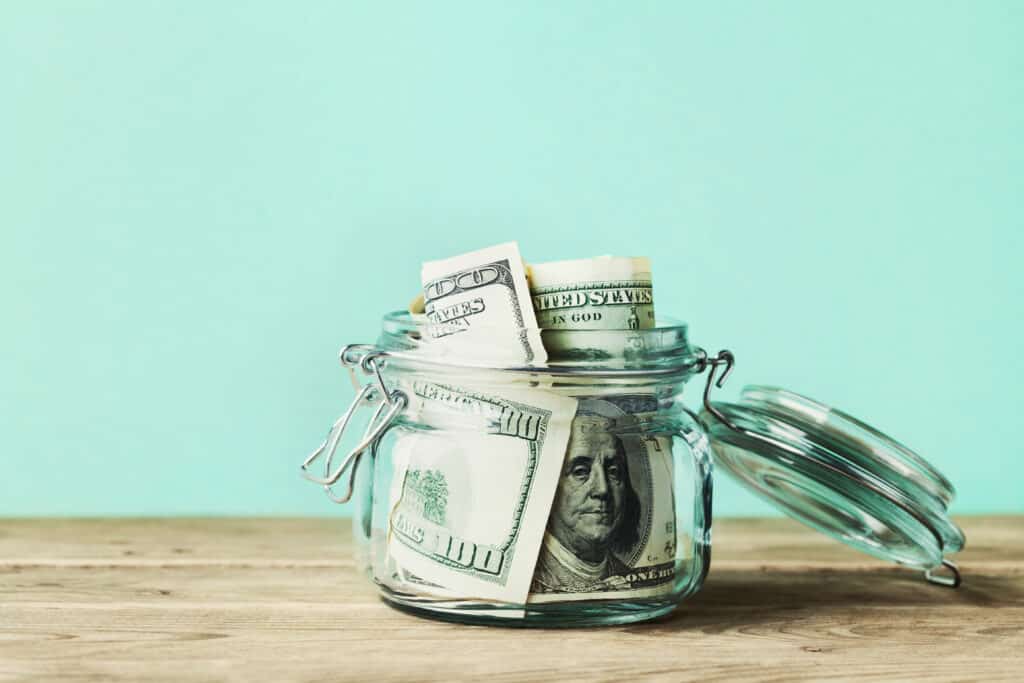Saving money is an important part of building financial security, so it’s natural to ask if saving 2500 a month is good or not. The answer isn’t as straightforward as you might expect—it depends on your goals and lifestyle. In this blog post, we’ll explore the pros and cons of setting such an ambitious savings goal and offer practical tips for getting started. Ultimately, you’ll be the best judge of whether saving 2500 a month is a realistic target for you. Read on to find out more!
Want to see your credit score for free and be able to use many financial tools right now? Just click here!

Definition of “saving
Saving is an important part of financial planning, and it refers to the practice of setting aside desired amounts of money every month. Over time-saving money accumulates and can be used for emergencies, investments, or lifestyle upgrades. The amount that one should save each month varies greatly depending on one’s income and expenses, but saving at least 10-15% of each month’s take-home pay can provide the necessary cushion for most people. For those with higher incomes saving 25% a month can be very advantageous in allowing for larger purchases such as cars or home down payments without taking out large loans. However, saving even small amounts of money per month still provides great benefits – saving just $2500 a year can translate into having a savings account of nearly $30,000 after five years.
Click Here to Check Your Credit Score for Free!
Benefits of saving money
Saving money is an essential part of financial stability and security. One great way to get started saving money is to deposit $2,500 each month into a savings account. This kind of commitment to saving can quickly add up and protect you from financial hardship down the road. Not only will saving this much each month increase your reserves in case of emergency expenses, it can also help you save towards long-term goals like retirement or a large purchase. Saving on a regular basis can also relieve stress since you’ll be protected financially in the event something unexpected arises. In addition to all these personal benefits, saving money can have ecological benefits as well. When we are secure with our finances, we’re in a better position to invest in projects that benefit our environment and lead us towards less wasteful living overall.
Is Saving 2500 a Month Good?
When saving 2500 a month, it is important to consider both the immediate and long-term benefits of saving. According to most experts, saving up to 10% of your income is considered a “good” habit for managing short-term financial stressors and for developing long-term wealth. At 2500 a month, it’s possible to reach this goal within the year with proper budgeting. Additionally, saving early in life leads to substantial savings in the future by allowing individuals additional time for compound interest growth. It is clear that saving 2500 a month can be a positive step toward fiscal health.
Financial goals and priorities
Creating financial goals and priorities is an important step in achieving financial stability. Whether you’re saving for retirement, a vacation, or to buy a house – it’s beneficial to break down your goal and give yourself milestones to hit as you progress towards it. For example, if saving $2500/month is your goal, that can seem intimidating, but breaking that down into smaller goals helps make it more manageable. Saving $500 each week might be a more achievable objective. By pursuing these financial goals with purpose, you will find yourself much better off in terms of achieving long-term success.
Earnings potential/income level
Earning potential is an important factor to consider when talking about income level. Although you might be making a great salary, if you are not saving and investing enough of it, your actual income may not be as high as it could be. For instance, saving just $2,500 a month for five years will create quite a sizeable sum that can serve many different needs, such as saving for retirement, buying property, or just creating a financial buffer in case of unforeseen expenses. Investing money wisely will help to increase earnings potential over time while preserving capital, leading to improved overall income levels.
Costs and lifestyle choices
Everyone’s lifestyle choices come with a cost. Whether it’s buying an expensive car, subscribing to luxury streaming services, or eating out often, there are bills to be paid. But saving around 2500 dollars a month can drastically change your budget. Not only can this help relieve stress from finances, but it also gives you a chance to invest money in bettering yourself and securing a strong financial future. Even small changes in your daily life – such as bringing lunch to work instead of eating out – can add up over time and have a huge impact on your overall financial climate. Developing good saving habits now is key for any long-term economic success you may want to pursue.

Strategies and Tips for Saving 2500 a Month
Planning and saving can be a difficult task, but it doesn’t have to be impossible! If you want to save $2500 per month, the key is to develop a budget that includes saving for both the short-term and the long-term. Start by creating a list of your income and expenses so that you can identify which items you can cut back on or eliminate altogether. You might consider saving 10% of your income each month as well as setting up an automated transfer into savings to ensure that your saving goals are met. Additionally, look for ways to maximize your savings by seeking out discounts or offers from retailers or restaurants when possible. Taking advantage of these types of opportunities could provide significantly more saving each month. With some disciplined financial practices and expansive saving opportunities, saving $2500 a month is certainly achievable!
Budgeting and creating a financial plan
Having a clear financial plan and budget is essential for saving money and staying out of debt. Not only does it help you keep track of your spending, but it can also help you save 2500 per month or more, depending on your situation. It’s important to include saving in your budget as well as paying expenses so that you can ensure you are working towards your long-term goals. A proper budget will enable you to understand what is necessary to cover your monthly expenses and what can be saved for the future, helping you reach those financial ambitions. A financial plan should be regularly reviewed, adjusted, and evaluated so that it can remain effective in the long run.
Seeking additional income sources.
If you’re looking for ways to increase your monthly income, saving $2500 a month should be at the top of your list. Having an extra source of income can provide much-needed financial security and peace of mind. Earning additional income may require commitment and planning, but by taking time to research and investigate your options, you can develop a plan that will help you achieve it. Whether it’s a side hustle, online gig, renting out unused space in your home or alley, or starting an investment portfolio, there are many routes you can take to reach that goal of saving $2500 per month. With a little effort and due diligence on your part, seeking additional income sources can pay major dividends!
Reducing expenses and avoiding wasteful spending
Finding out how to reduce overall expenses in order to avoid wasteful spending can be a challenge. However, taking proactive measures such as understanding our needs and cutting back on unnecessary items can make saving money much easier. For example, a simple goal of saving $2500 per month can be met by setting up a budget and tracking our expenses on a regular basis. This will help us gain insight into what we are spending and where we can save money. In addition, building an emergency fund is also helpful in avoiding wasteful spending since it gives us the peace of mind that we have extra funds for any unexpected expenses. Overall, saving money and avoiding wasteful spending do not need to be complicated. All it takes is some careful planning and determination to have financial success.
FAQS
Q. How much should I start saving per month?
Saving money is something that most people know they should do, but it can be hard to know exactly how much you should save per month. While there’s no one-size-fits-all answer to this question, there are a few things to consider when determining how much to save. First, it’s important to take a look at your monthly expenses and income to get a sense of what you can realistically afford to put away. It’s also a good idea to think about any big financial goals you have, like buying a house or saving for retirement, and factor those into your savings plan. Remember, even small amounts can add up over time, so don’t get discouraged if you can only save a little bit each month. The key is to start somewhere and stay consistent. Your future self will thank you!
Q. Is saving $1,500 a month good?
Saving $1,500 a month is no small feat, and it’s definitely worth feeling proud about. Whether you’re planning for a rainy day or working towards a specific financial goal, that amount of savings shows you’re on the right track. Of course, what counts as “good” varies from person to person and situation to situation. For some, $1,500 might not be enough to cover all their expenses and save for the future. For others, it might be more than enough. The important thing is to keep track of your finances, set goals that are realistic and achievable for you, and make sure you’re staying on top of your money game. At the end of the day, no amount of savings is too small or too big, as long as you’re making progress towards your own personal financial goals.
Q. How much should I save on 3000 a month?
So, you’re wondering how much you should save on a monthly salary of 3000 bucks? Well, the answer isn’t as straightforward as you might think. It largely depends on your personal circumstances and financial goals. Of course, it’s always a good idea to save as much as possible – especially for emergencies and future expenses. A general rule of thumb is to save at least 20% of your income, which in your case would be $600. However, if you’re carrying debt or have other financial obligations, you might need to adjust that number. Ultimately, the best savings plan for you is one that is manageable, sustainable, and helps you achieve your financial objectives. So, whether you’re saving for a down payment on a house or a dream vacation, start by setting a goal and creating a budget that works for you.
Click Here to Buy Stocks and Crypto on eToro!
Q. How much savings should I have at 35?
As we grow older, it’s natural to start thinking more about our finances and savings goals. If you’re approaching 35 and wondering how much you should have put away, you’re not alone. While there’s no one-size-fits-all answer to this question, financial experts generally suggest having at least three to six months’ worth of living expenses saved up in an emergency fund. Beyond that, it’s important to consider your long-term goals and start planning for retirement. Whether you’re just starting out on your savings journey or looking to make some adjustments to your current strategy, taking the time to assess your financial situation can help you feel more confident and secure in the years to come.
Conclusion
In conclusion, saving $2500 a month can be an achievable goal with some careful planning and dedication. It’s important to start by developing a budget that includes both expenses and savings, as well as seeking additional income sources and reducing any wasteful spending. With the right steps in place, you’ll be able to reach your financial goals in no time. Don’t be afraid to get creative or seek out help, as this can make all the difference in your saving journey! Good luck!
Best of luck with reaching your financial goals!
